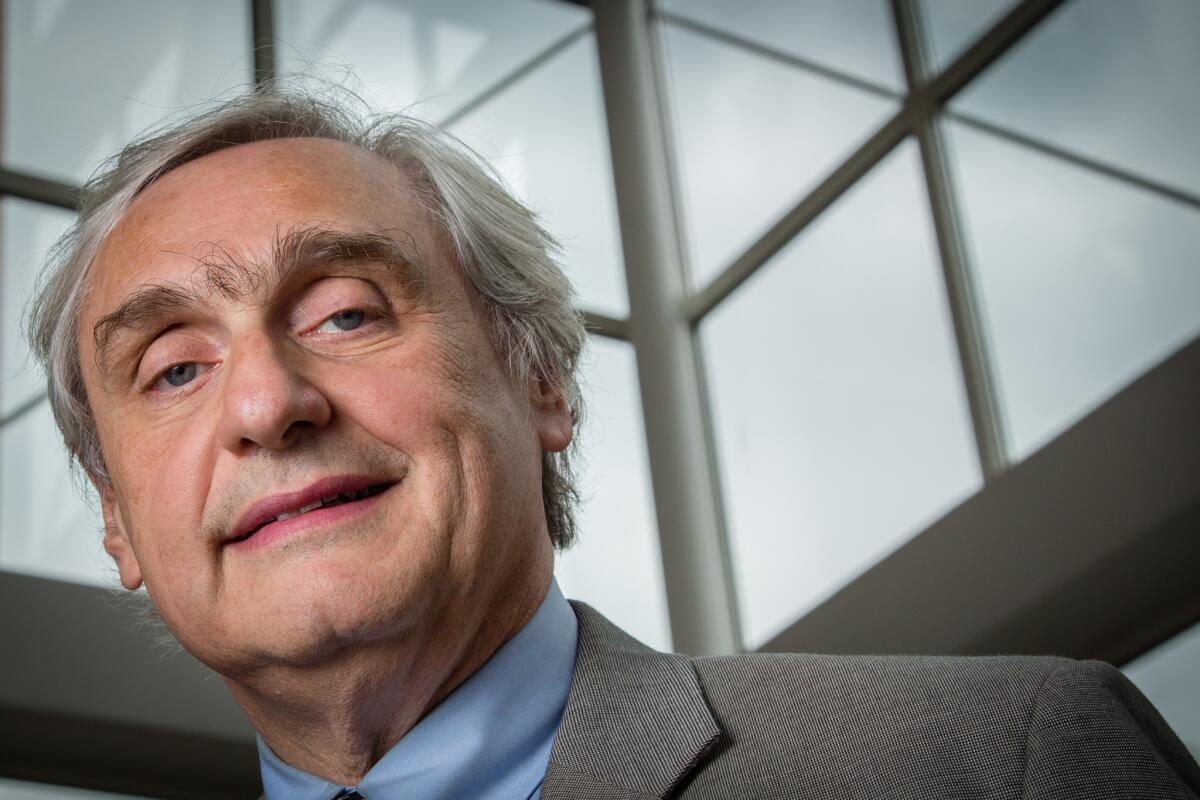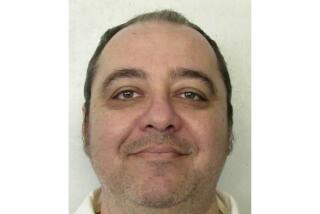Column: Judge Alex Kozinski on bringing back firing squads: No, I wasn’t kidding

Google “Alex Kozinski firing squad” and nearly 20,000 mentions turn up. But those are just a few words plucked from a detailed dissent by the chief judge of the U.S. 9th Circuit Court of Appeals, arguing, in essence, that Americans are hypocrites about the death penalty: We support it but don’t deal with its reality. Kozinski’s dissent came as part of the last-minute flurry of appeals by an Arizona death row prisoner who, two days later, would die after a protracted and messy lethal injection. Kozinski can’t say more about the specifics of that case, but after 30 years on the appellate bench, he’s confronted capital punishment again and again. From his chambers overlooking Pasadena’s Arroyo Seco, he gave voice to what he has learned.
Were you being hyperbolic about firing squads to get our attention?
No, I was quite serious. We’ve had a lot of litigation about problems with [lethal] drugs. Meanwhile we are spending an immense amount of money and resources, and giving false hopes to the victims’ families, and we don’t really have a death penalty at all in California.
I never thought using drugs was a good idea. People who make the equipment, the drugs, the catheters — they’re involved in lifesaving, not killing. Lethal injection in particular, it’s all hands-on; they have to strap the body down, they have to put the catheter in, take the vital signs. It’s a hard position for a doctor. If there’s still a pulse or heartbeat, maybe they’ll give more drugs to finish the job, so the doctor is put in a position of essentially helping them.
With a firing squad, you strap him down and leave him and somebody else does the shooting. The people doing the shooting don’t have to see him up close; in fact, you don’t even need people to pull the trigger anymore. You can have it triggered remotely.
Of course it does raise the question of whether we are really comfortable with having a death penalty that literally sheds blood. The thing about the drugs is that it’s a mask — you’re not really shedding blood. [But] it’s just as violent, just as brutal.
So people may support the death penalty but be squeamish about what it involves. Why? Americans used to show up by the hundreds for executions.
I think public sensibilities have changed. The electric chair was the most common, the gas chamber was next, and a few states had hanging. Each of these methods has its own problems. So I think the states said: “It [lethal injection] is an easy solution.” Of course if you do it often enough, you have problems, and of course opponents of the death penalty publicize that, and drug companies aren’t comfortable with it, and I can see why. But I can assure you that people who make guns and ammo would not have any such reaction. We’re a culture where guns are accepted.
But you also suggested the guillotine, which to me crosses into cruel and unusual territory.
I think people find it distasteful because it’s so associated with the Reign of Terror. We’ve all read “A Tale of Two Cities.”
Are we trying to have it both ways with capital punishment?
Who doesn’t? I think the government officials who are running it are dragging their feet. I don’t know what the reaction would be in California if, let’s say, we started shooting people. Some people would be horrified, some would back away and others would say it’s fine. There’s some thought that it might actually increase the deterrent value. I don’t think that being put to death by going to sleep is such a great deterrent.
Nearly 20 years ago, you made a case for the death penalty in the New York Times, saying that a majority of Americans supported it. Has that changed?
My impression is that public support is as strong as ever. Whether you have public [executions] or [a few] witnesses, we need to be in touch with what we’re doing. I’m not uncomfortable with it, but I’ve never been to an execution. I might feel different if I went to view an execution. But I think I’ve read enough cases. I am not opposed to the death penalty. Some people simply deserve to die, with crimes that are so horrendous.
You once corresponded with and visited a man on California’s death row who ultimately got a new trial and got off death row. Did you learn from that?
I always learn something. What we do [as judges] is so genteel and antiseptic, it’s always good to actually meet the people who suffer the consequences. I get letters from prisoners, and it affects me. I imagine myself in their situation. One of the reasons I’m not opposed to the death penalty is that life in prison in a maximum security setting in my judgment is worse than death. But nobody focuses on that. There are vastly more people out there with no hope of ever getting out of prison, some in solitary confinement, some suffering many levels of hell.
Are objections to lethal injection just a stalking horse for getting rid of the death penalty altogether?
I think the people who are fighting it are out to end it. My purpose is to say: “This is expensive, it causes delay, uncertainty, probably a lot of grief, so we ought to come up with something better.” And we ought to come face to face with what we’re doing. If we’re not comfortable with what we’re doing, we should not be doing it. But if we are comfortable with what we’re doing, we should do it better.
I think a narrow death penalty would be far more effective: The torturer/child killers, the rapist killers — there are cases that make the hairs on the back of your neck stand. Imagining yourself being the victim, or being the family of the victim when you learned what happened — it’s unthinkable. Some people get convicted and properly sentenced; they deserve it.
Why have most other Western countries abolished the death penalty?
Most of these countries have in their recent past abused it. I’m not really surprised or unhappy that Germany has outlawed the death penalty. They sort of misused it within living memory, so they probably ought not to be trusted to have one. Romania [where he was born] — I’m just as glad they don’t have the death penalty, because a lot of people were killed wantonly [there]. In this country by and large we’ve had executions done with due process. We’ve had a sad history of lynchings in the South, but in the Wild West they had trials, some measure of due process. It’s not that we’re guilt-free, but we have less to account for than other countries.
When the Supreme Court emptied death rows in 1972, did it solve one set of problems and set another in motion?
Absolutely. It was a case where [the justices’] opinions were all over the place. Then the states went back in light of the opinions and tried to build a set of death penalty laws. What they came up with was like a horse designed by committee — a dromedary. It’s a procedure that is fraught with uncertainty, discretion and the possibility of being overturned on appeal because there are so many things it has to satisfy. It took us a good 30 years to sort through the main issues, but it’s still immensely complicated.
My colleague Judge Arthur Alarcon, in the Loyola Law Review, pointed out the expenses we have in California maintaining a death row and what you get for it: It’s nothing, nothing at all. We spend all the money and cause all the grief and give victims’ families the false hopes that someone will be executed, and then it doesn’t happen.
But the public still gets to say we have the death penalty.
Yes, we have no bananas.
This interview was edited and condensed. patt.morrison@latimes.com. Twitter: @pattmlatimes
More to Read
A cure for the common opinion
Get thought-provoking perspectives with our weekly newsletter.
You may occasionally receive promotional content from the Los Angeles Times.







